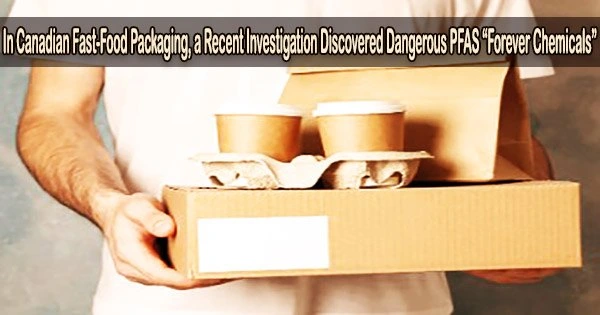For the first time, toxic PFAS chemicals short for per and polyfluoroalkyl substances have been found in levels in Canadian fast-food packaging, specifically water and grease-repellent paper substitutes for plastic, according to researchers at the Universities of Toronto, Notre Dame, and Indiana.
The results, which were published today in Environmental Science & Technology Letters, imply that food packaging contaminates people’s food, exposing them to PFAS, which have been linked to negative health effects like increased cancer risk and immune system harm.
Furthermore, PFAS reach the environment after packaging material is dumped into waste streams, where these “forever chemicals” will never degrade. Two significant restaurant chains have pledged to become PFAS-free by 2025, and 11 U.S. states have banned PFAS from the majority of food packaging as a result of these health and environmental dangers.
“As Canada restricts single-use plastics in food-service ware, our research shows that what we like to think of as the better alternatives, such as paper wrappers and compostable bowls, are not so safe and ‘green’ after all. In fact, they may harm our health and the environment from our air to our drinking water by providing a direct route to PFAS exposure,” says Miriam Diamond, professor in the Department of Earth Sciences and School of the Environment at the University of Toronto and study co-author.
The use of PFAS in food packaging is a regrettable substitution of trading one harmful option single-use plastics for another. We need to strengthen regulations and push for the use of fiber-based food packaging that doesn’t contain PFAS.
Professor Miriam Diamond
To conduct the research, the scientists gathered 42 paper-based bowls and wrappers from fast-food outlets in Toronto and evaluated them for total fluorine, a PFAS indication. Eight of those samples with high total fluorine concentrations were then thoroughly analyzed.
Fiber-based molded bowls, which are marketed as “compostable,” had PFAS levels three to 10 times higher than doughnut and pastry bags. PFAS are added to these bowls and bags as a water and grease-repellent.
PFAS are a complex group of about 9,000 manufactured chemicals, few of which have been studied for their toxicity. A PFAS that is known to be toxic 6:2 FTOH (6:2 fluorotelomer alcohol) was the most abundant compound detected in these samples.
This molecule can change into other PFAS, which can increase a consumer’s exposure to the other PFAS that were frequently discovered in all of the tested Canadian fast-food packaging. They discovered many PFAS in food packaging for the first time, demonstrating how challenging it is to monitor the presence of this diverse family of chemicals.
Critically, the study’s findings contradicted statements that polymeric PFAS, a form made up of bigger molecules, do not degrade and escape from products, showing that the content of PFAS decreased by up to 85% when the items were stored for two years.
Another way for people to be exposed to these chemicals is by the release of PFAS from food packaging into indoor air.
“The use of PFAS in food packaging is a regrettable substitution of trading one harmful option single-use plastics for another. We need to strengthen regulations and push for the use of fiber-based food packaging that doesn’t contain PFAS,” says Diamond.
















